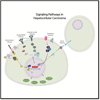Molecular therapies in hepatocellular carcinoma: what can we target?
- PMID: 24573715
- PMCID: PMC4344119
- DOI: 10.1007/s10620-014-3058-x
Molecular therapies in hepatocellular carcinoma: what can we target?
Abstract
Numerous signaling pathways, such as Ras/Raf/MAPK, have been implicated in hepatic carcinogenesis. There are at least 35 combination therapy studies for advanced stage hepatocellular carcinoma (HCC) ongoing, and numerous reagents are being tested targeting novel signaling cascades. The management of HCC has changed substantially in recent times, and the successful development of sorafenib has prompted further expansion on molecular targeted therapies to potentially inhibit different pathways in hepatocarcinogenesis.
Figures



Similar articles
-
Targeted therapy of hepatocellular cancer.Expert Opin Investig Drugs. 2010 Feb;19(2):265-74. doi: 10.1517/13543780903514110. Expert Opin Investig Drugs. 2010. PMID: 20074016 Review.
-
PKI-587 and sorafenib targeting PI3K/AKT/mTOR and Ras/Raf/MAPK pathways synergistically inhibit HCC cell proliferation.J Surg Res. 2012 Aug;176(2):542-8. doi: 10.1016/j.jss.2011.10.045. Epub 2011 Nov 21. J Surg Res. 2012. PMID: 22261591
-
Role of BRAF in Hepatocellular Carcinoma: A Rationale for Future Targeted Cancer Therapies.Medicina (Kaunas). 2019 Nov 21;55(12):754. doi: 10.3390/medicina55120754. Medicina (Kaunas). 2019. PMID: 31766556 Free PMC article. Review.
-
Targeting KDM1A attenuates Wnt/β-catenin signaling pathway to eliminate sorafenib-resistant stem-like cells in hepatocellular carcinoma.Cancer Lett. 2017 Jul 10;398:12-21. doi: 10.1016/j.canlet.2017.03.038. Epub 2017 Apr 2. Cancer Lett. 2017. PMID: 28377178
-
Beyond sorafenib: novel targeted therapies for advanced hepatocellular carcinoma.Expert Opin Investig Drugs. 2010 May;19(5):663-72. doi: 10.1517/13543781003767426. Expert Opin Investig Drugs. 2010. PMID: 20367287 Review.
Cited by
-
Identification and Therapeutic Intervention of Coactivated Anaplastic Lymphoma Kinase, Fibroblast Growth Factor Receptor 2, and Ephrin Type-A Receptor 5 Kinases in Hepatocellular Carcinoma.Hepatology. 2019 Feb;69(2):573-586. doi: 10.1002/hep.29792. Epub 2018 Mar 24. Hepatology. 2019. PMID: 29356025 Free PMC article.
-
A Hybrid Chalcone Combining the Trimethoxyphenyl and Isatinyl Groups Targets Multiple Oncogenic Proteins and Pathways in Hepatocellular Carcinoma Cells.PLoS One. 2016 Aug 15;11(8):e0161025. doi: 10.1371/journal.pone.0161025. eCollection 2016. PLoS One. 2016. PMID: 27525972 Free PMC article.
-
Molecular mechanism of hepatitis B virus-induced hepatocarcinogenesis.World J Gastroenterol. 2014 Sep 7;20(33):11630-40. doi: 10.3748/wjg.v20.i33.11630. World J Gastroenterol. 2014. PMID: 25206269 Free PMC article. Review.
-
Optimal therapy for patients with hepatocellular carcinoma and resistance or intolerance to sorafenib: challenges and solutions.J Hepatocell Carcinoma. 2017 Nov 8;4:131-138. doi: 10.2147/JHC.S124366. eCollection 2017. J Hepatocell Carcinoma. 2017. PMID: 29184856 Free PMC article. Review.
-
Cancer stem cells and evolving novel therapies: a paradigm shift.Stem Cell Investig. 2018 Jan 23;5:4. doi: 10.21037/sci.2018.01.03. eCollection 2018. Stem Cell Investig. 2018. PMID: 29430460 Free PMC article. Review.
References
-
- Llovet JM, Burroughs A, Bruix J. Hepatocellular carcinoma. Lancet. 2003 Dec;362(9399):1907–1917. - PubMed
-
- El-Serag HB. Hepatocellular carcinoma. N. Engl. J. Med. 2011 Sep;365(12):1118–1127. - PubMed
-
- Chen C, Yang H, Yang W, Liu C, Chen P, You S, Wang L, Sun C, Lu S, Chen D, Chen C. Metabolic Factors and Risk of Hepatocellular Carcinoma by Chronic Hepatitis B/C Infection: A Follow-up Study in Taiwan. Gastroenterology. 2008 Jul;135(1):111–121. - PubMed
Publication types
MeSH terms
Substances
Grants and funding
LinkOut - more resources
Full Text Sources
Other Literature Sources
Medical
Research Materials
Miscellaneous

